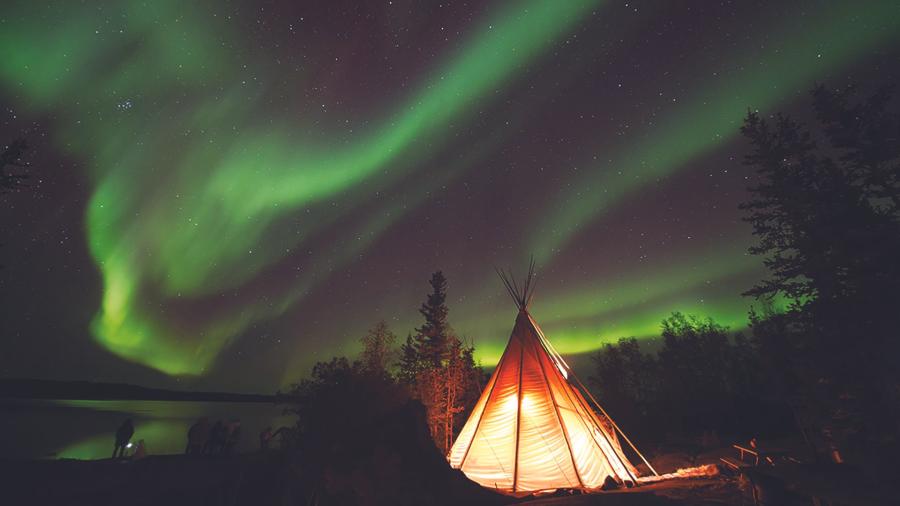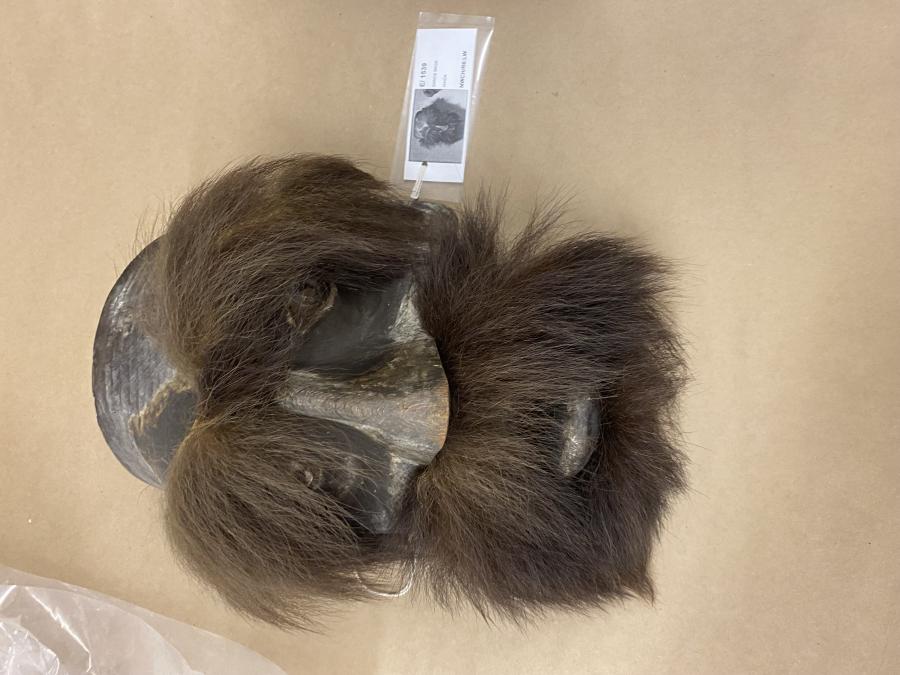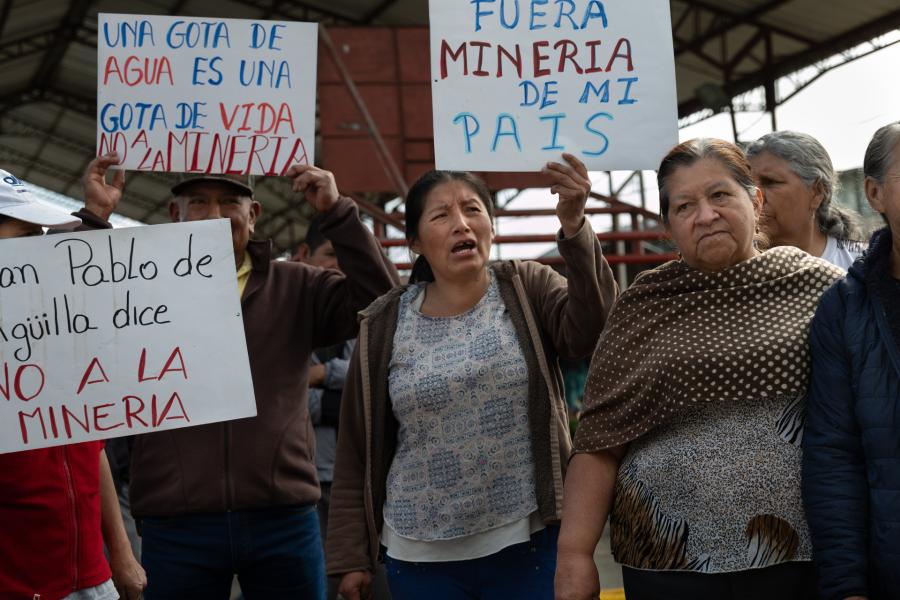"Survival" is a word the Innu know well. "Not so long ago -- within the last 50 years, in fact -- our parents and grandparents lived on the land. Survival was, for them, part of daily life as a hunting people. They depended on the movements of the caribou, the abundance of small game, and the predicatability of the weather. A small thing -- a simple mistake, a run of bad weather, or a shift in the wind -- could mean the difference between starvation and survival. Our parents learned to be attentive to what was happening on the land and among the animals. These were the skills that enabled us to survive as we have for thousands of years in a land so harsh the Europeans called it the "land given to Cain."
Survival was something different for my generation. We grew up in the communities to which the government lured our parents in the 1960s with promises of houses, health care, and a better way of life. Whithin a few short years of settlement, most of our parents were reduced to alcoholism and idleness, many of our brothers and sisters were sexually abused by teachers and priests, and almost all of us were caught up in a system that seemed to be designed to destroy us as a people.
Over a span of perhaps 20 years, we were reduced from self-reliance to a situation of almost total dependency. Our parents, hunters all their lives, were branded as poachers and prosecuted by wildlife officers for trying to feed their families; our teachers tried to make us ashamed of our identity and our culture. It was like we'd suddenly become unwelcome guests in our own land.
At the time, we didn't have the skills we needed to survive as colonized people. Few of us spoke English or French. We depended on the priests to deal with the outside world on our behalf, but they were as much a part of the system as were the government officials. As young people, we found that our grandparents could teach us little about talking to the government, or negotiating a land claim, or dealing with proposed mining and hydro developments. We didn't understand how the Canadian system worked -- only that we had somehow ended up at the bottom of it.
The devastation wrought by these changes is evident in the shattered self-esteem of my parents' generation, and is a gaping wound for the generations of Innu growing to adulthood today. The evidence of this damage is in the epidemic of suicides and solvent abuse among our youth. Children as young as 12 have hung themselves; others have lost themselves in solvents and drugs. Our communities have some of the highest suicide rates on the planet.
But among this wreckage are the survivors. This is perhaps our people's greatest strength: we know how to survive. It is what we have always done. And we, the survivors, are quickly learning what we need to do in order to ensure that our people will never again be caught in these circumstances.
We have learned a great deal about Canadians over the years. We've learned how the Canadian people and government want to be seen by other nations. We pay close attention when the Prime Minister talks about human rights or when the Supreme Court says something about aboriginal title. What we see, beneath the rhetoric, are Canadians struggling to deal with their colonial reality, with the embarrassing legacies of their past attempts to assimilate us, and, most of all, with the awkward fact that under the very laws they profess to be governed by, much of this country is still native land.
If politics is a kind of theatre, maybe we are learning to become better actors. In the early years of our efforts to gain recognition for our land and our rights, we were often cast as extras, or even as part of the scenery, in the political dramas being staged in Canada, the United States, and Europe by peace and environmental groups. To some of our supporters, we are the victims of the NATO war machine. To others, we are "noble savages" on the verge of extinction. To the extent that our cause can be understood in these simplistic terms, or aligned with causes that Europeans and Canadians can understand and support, we are assured of an audience. But if we are known only in these terms, are we really being listened to -- or are we just being talked about?
If we are honest with each other, we will recognize that for most Canadians, aboriginal people are more symbolic than real. We all know the stereotypes: we are "good Indians" when we are portrayed as we might have been before European contact, or when we are living a "traditional life"; we are "bad Indians" when we show up drunk on the corners of cities, looking rough and panhandling for change. We are thought to have all the wisdom of our elders when it comes to the use and stewardship of the land, but we are treated like children when it comes to the management of our own affairs. All of these portrayals of aboriginal people are myths. They say much more about what Canadians think about themselves and about their relationships with aboriginal people than they do about us.
When we adopt the language used by anthropologists, lawyers, or bureaucrats to talk to Canadians about our way of life, our rights, or our future, do we give up some of who we are? Does survival in the 21st century mean that we must start thinking of ourselves in Western terms? A ruthless kind of logic is at work in the whole process. To survive as a people in Canada today, we've had to adopt positions that are fundamentally offensive to what most of us really believe. Take our land claim as an example. When our elders meet with the government, they inevitably ask where the government was when we were on the land. They talk about their travels, and the thousands of kilometers they have walked, canoed, and snowshoed without ever finding so much as a trace of the government. Our land became Newfoundland through some kind of legal fiction that should be nothing short of embarrassing. But this government sticks by its fiction and asks us to produce evidence of our land use and occupation before negotiation of title can begin. And we do.
What's more, even when we accept that these are the rules of the game and agree to negotiate, we are constantly reminded that Canada is not only the other party in these so-called negotiations, it also controls the process. We are pressured into agreeing to what is not in our best interests. We are told that if we don't conclude our negotiations, developments will go ahead, with or without us.
And we see that when there is a break-through in the treaty process -- when something actually gets done, like with the Nisga'a Treaty or the Labrador Inuit AIP -- white politicians start inflaming their constituencies with talk of race-based governments. Do they ever look in the mirror or take stock of just how far from our principles we have come to get an agreement in the first place?
You may well ask, "Why are you part of a process that is manifestly unjust and unbalanced?" The truth is, the Canadian government tells us that it's this, or the abyss -- and for the moment, this seems preferable. "This" is about survival. While the Canadian government is trying to extract a surrender from us at the claims table, immigration into our land continues, companies stake mining claims, massive new hydroelectric projects are planned, war games are fought over our heads, and our children are killing themselves in despair. All the while, the wealth from our land continues to flow south to enrich Canadians. As a leader and as a politician, I'm aware of the contradictions at the heart of the claims process, and of the fundamental inconsistencies that an organization like the Innu Nation embodies. I know that when we negotiate with Canadians on their terms, we stand to lose something of ourselves in the process. What I don't see, at the moment, is an alternative.
But this can change. Most Canadians are fundamentally decent people, but too many of them are in denial about their history. We all need to move out of the past. We have chosen to stop looking at ourselves as victims. We are survivors, and we will have a future.
It has been said that a society can be judged by how it treats its least fortunate members, and by that standard, Canada has much to account for. Canadians must stop thinking of aboriginal people as symbols of the past and take a good look at what is really going on in the here and now. They need to stop thinking of themselves as generous while they continue to enrich themselves from our dispossession.
These kinds of changes will take time. The starting place is where we are today -- at the treaty table. We've been here for nearly a decade, waiting for Canada and Newfoundland to negotiate in good faith. Individual Canadians are the ones who need to speak out -- to demand that these governments deal with the Innu and other aboriginal people fairly and justly.
I remain an optimist. I know from my own experience, and from some of the examples that have inspired me, that there is reason for hope, and that there are possibilities for change. By working with us to ensure our survival, Canadians may well ensure that their own future is one we can all be proud of.
Article copyright Cultural Survival, Inc.



